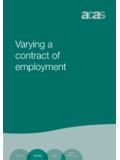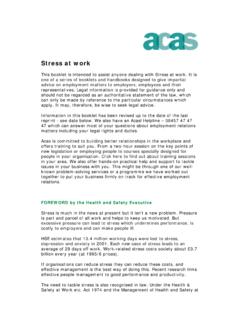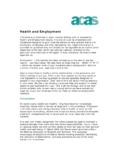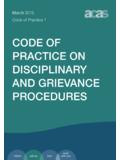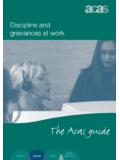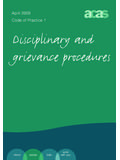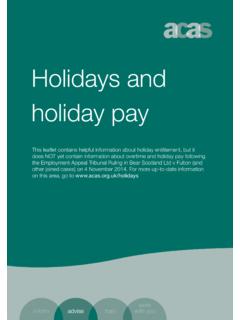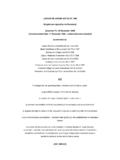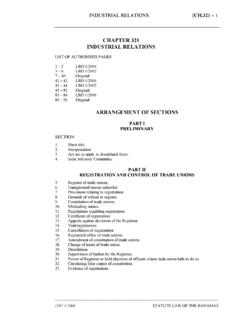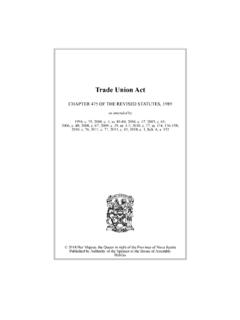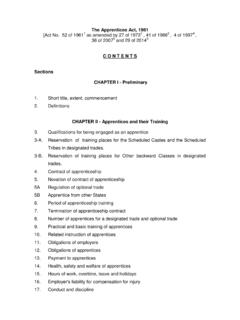Transcription of Time off for trade union duties and activities - acas.org.uk
1 1. Time off for trade union duties and activities including guidance on time off for union learning representatives Code of Practice 3. Published by TSO (The Stationery Office), part of Williams Lea Tag, and available from: Online Mail, Telephone, Fax & E-mail TSO. PO Box 29, Norwich, NR3 1GN. Telephone orders/General enquiries: 0333 202 5070. Fax orders: 0333 202 5080. E-mail: Textphone 0333 202 5077. TSO@Blackwell and other Accredited Agents Published for Acas under licence from the Controller of Her Majesty's Stationery Office. Crown Copyright 2004 All rights reserved. Copyright in the typographical arrangement and design is vested in the Crown. Applications for reproduction should be made in writing to the Copyright Unit, H er Majesty's Stationery Office, St Clements House, 2-16 Colegate, Norwich NR3 1BQ. First published 2004.
2 Second edition 2009. ISBN 978011000000 0. Printed in the United Kingdom by The Stationery Office. I. 0000000 c00 3/09 421219. Contents Introduction 5. Terminology 5. The background 6. General purpose of the Code 7. Structure of the Code 7. Status of the Code 8. Section 1: Time off For trade union duties 9. Entitlement 9. Examples of trade union duties 11. union Learning Representatives 13. Payment for time off for trade union duties 15. Time off to accompany Workers at disciplinary or Grievance Hearings 15. Section 2: Training of union representatives in aspects of employment relations and employee development 17. Entitlement 17. What is relevant employment relations training? 18. Training for union Learning Representatives 20. Payment for time off for training 23. Section 3: Time off for trade union activities 24. Entitlement 24.
3 What are examples of trade union activities ? 24. Payment for time off for trade union activities 25. Section 4: The responsibilities of employers and trade unions 26. General considerations 26. Requesting time off 29. 4 Time off for trade union duties and activities Section 5: Agreements on time off 32. Section 6: Industrial action 35. Section 7: Resolving disputes 36. Annex: The law on time off for trade union duties and activities 37. This code revises the Acas Code of Practice on Time Off for trade union duties and activities which came into effect on 27 April 2003. This revised code is issued under Section 199. of the trade union and Labour Relations (Consolidation). Act 1992 and comes into force by order of the Secretary of State on 1 January 2010. 5. Introduction 1 Under section 199 of the trade union and Labour Relations (Consolidation) Act 1992 the Advisory, Conciliation and Arbitration Service (Acas) has a duty to provide practical guidance on the time off to be permitted by an employer: (a) to a trade union official in accordance with section 168 of the trade union and Labour Relations (Consolidation) Act 1992; and (b) to a trade union member in accordance with section 170 of the trade union and Labour Relations (Consolidation) Act 1992.
4 Section 199 of the Act, as amended by the Employment Act 2002, also provides for Acas to issue practical guidance on time off and training for union Learning Representatives. This Code, which replaces the Code of Practice issued by Acas in 2003, is intended to provide such guidance. Advice on the role and responsibilities of employee representatives is provided in two Acas Guides: trade union representation in the workplace: a guide to managing time off, training and facilities and Non- union representation in the workplace: a guide to managing time off, training and facilities. Terminology 2 In this Code the term trade union official', is replaced by union representative'. In practice there is often confusion between an official' and an officer' of a union and the term representative' is commonly used in practice. Section 119 of the trade union and Labour Relations (Consolidation) Act 1992 defines an official as 6 Time off for trade union duties and activities (a) an officer of the union or of a branch or section of the union , or (b) a person elected or appointed in accordance with the rules of the union to be a representative of its members or of some of them, and includes a person so elected or appointed who is an employee of the same employer as the members or one or more of the members whom he is to represent'.
5 Section 181 (1) of the same Act defines a representative', for the purposes of sections 181 185 of the Act, as an official or other person authorised by the union to carry on such collective bargaining'. In this Code a union representative means an employee who has been elected or appointed in accordance with the rules of the independent union to be a representative of all or some of the union 's members in the particular company or workplace, or agreed group of workplaces where the union is recognised for collective bargaining purposes. This is intended to equate with the legal term trade union official' for the purposes of this Code. The term union full-time officer' in this Code means a trade union official who is employed by an independent trade union to represent members in workplaces, or groups of workplaces, where the union is recognised for collective bargaining purposes.
6 A union Learning Representative is an employee who is a member of an independent trade union recognised by the employer who has been elected or appointed in accordance with the rules of the union to be a learning representative of the union at the workplace. The background 3 union representatives have had a statutory right to reasonable paid time off from employment to carry out trade union duties and to undertake trade union 7. training since the Employment Protection Act 1975. union representatives and members were also given a statutory right to reasonable unpaid time off when taking part in trade union activities . union duties must relate to matters covered by collective bargaining agreements between employers and trade unions and relate to the union representative's own employer, unless agreed otherwise in circumstances of multi- employer bargaining, and not, for example, to any associated employer.
7 All the time off provisions were brought together in sections 168 170 of the trade union and Labour Relations (Consolidation) Act 1992. Section 43 of the Employment Act 2002 added a new right for union Learning Representatives to take paid time off during working hours to undertake their duties and to undertake relevant training. The rights to time off for the purpose of carrying out trade union duties , and to take time off for training, were extended to union representatives engaged in duties related to redundancies under Section 188 of the amended 1992 Act and to duties relating to the Transfer of Undertakings (Protection of Employment) Regulations 2006. General purpose of the Code 4 The general purpose of the statutory provisions and this Code of Practice is to aid and improve the effectiveness of relationships between employers and trade unions.
8 Employers and unions have a joint responsibility to ensure that agreed arrangements work to mutual advantage by specifying how reasonable time off for union duties and activities and for training will work. Structure of the Code 5 Section 1 of this Code provides guidance on time off for trade union duties . Section 2 deals with time off for training of trade union representatives and offers 8 Time off for trade union duties and activities guidance on sufficient training for union Learning Representatives. Section 3 considers time off for trade union activities . In each case the amount and frequency of time off, and the purposes for which and any conditions subject to which time off may be taken, are to be those that are reasonable in all the circumstances. Section 4 describes the responsibilities which employers and trade unions share in considering reasonable time off.
9 Section 5 notes the advantages of reaching formal agreements on time off. Section 6 deals with industrial action and Section 7 with methods of appeal. 6 The annex to this Code reproduces the relevant statutory provisions on time off. To help differentiate between these and practical guidance, the summary of statutory provisions relating to time off which appears in the main text of the Code is in bold type. Practical guidance is in ordinary type. While every effort has been made to ensure that the summary of the statutory provisions included in this Code is accurate, only the courts can interpret the law authoritatively. Status of the Code 7 The provisions of this Code are admissible in evidence in proceedings before an Employment Tribunal relating to time off for trade union duties and activities . Any provisions of the Code which appear to the Tribunal to be relevant shall be taken into account.
10 However, failure to observe any provision of the Code does not of itself render a person liable to any proceedings. 9. SECTION 1. Time off For trade union duties union representatives undertake a variety of roles in collective bargaining and in working with management, communicating with union members, liaising with their trade union and in handling individual disciplinary and grievance matters on behalf of employees. There are positive benefits for employers, employees and for union members in encouraging the efficient performance of union representatives' work, for example in aiding the resolution of problems and conflicts at work. The role can be both demanding and complex. In order to perform effectively union representatives need to have reasonable paid time off from their normal job in appropriate circumstances. Entitlement 8 Employees who are union representatives of an independent trade union recognised by their employer are to be permitted reasonable time off during working hours to carry out certain trade union duties .

